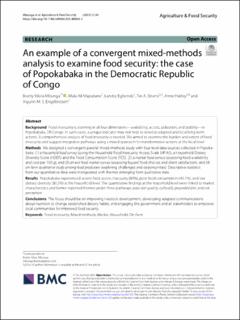An example of a convergent mixed-methods analysis to examine food security: the case of Popokabaka in the Democratic Republic of Congo
Mbunga, Branly Kilola; Mapatano, Mala Ali; Egbende, Landry; Strand, Tor Arne; Hatløy, Anne; Engebretsen, Ingunn Marie Stadskleiv
Journal article, Peer reviewed
Published version

Åpne
Permanent lenke
https://hdl.handle.net/11250/3122679Utgivelsesdato
2023Metadata
Vis full innførselSamlinger
Sammendrag
Background Food insecurity is alarming in all four dimensions—availability, access, utilization, and stability—in Popokabaka, DR Congo. In such cases, a unique indicator may not help to develop adapted and local long-term actions. A comprehensive analysis of food insecurity is needed. We aimed to examine the burden and extent of food insecurity and suggest integrative pathways using a mixed approach for transformative actions at the local level. Methods We designed a convergent parallel mixed-methods study with four-level data sources collected in Popokabaka: (1) a household food survey (using the Household Food Insecurity Access Scale (HFIAS), a Household Dietary Diversity Score (HDDS) and the Food Consumption Score (FCS), (2) a market food census (assessing food availability and cost per 100 g), and (3) an exit food market survey (assessing buyers' food choices and client satisfaction), and (4) on-farm qualitative study among food producers (exploring challenges and opportunities). Descriptive statistics from our quantitative data were triangulated with themes emerging from qualitative data. Results Popokabaka experienced severe food access insecurity (89%), poor food consumption (40.7%), and low dietary diversity (30.2%) at the household level. The quantitative findings at the household level were linked to market characteristics and farmer-reported themes under three pathways: poor diet quality, culturally grounded diet, and risk perception. Conclusions The focus should be on improving livestock development, developing adapted communications about nutrition to change established dietary habits, and engaging the government and all stakeholders to empower local communities for improved food security.
